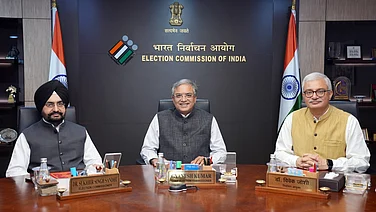Works of globally acclaimed Kashmiri-American poet Agha Shahid Ali and prominent journalist and writer Basharat Peer have been removed from the curriculum of the University of Kashmir ostensibly as a result of the New Education Policy (NEP). The University of Kashmir used to teach three of Shahid Ali’s poems—‘Postcard from Kashmir’, ‘In Arabic’, and ‘The Last Saffron’ to MA students. Peer’s Curfewed Night was also part of the same course. Two poems of Shahid Ali—‘Postcard from Kashmir’ and the ‘Wolf’s Postscript’— were also taught in the BA course at the University of Kashmir.
Professor Nilofer Khan, Vice-Chancellor of the University of Kashmir, said that the new policy that has been introduced in the union territory is the reason the university administration decided to remove some literature from the curriculum. She, however, refused to say whether any other works have been removed apart from that of Shahid Ali and Peer.
Sources say the decision has come after Shahid Ali’s poetry and Peer’s acclaimed memoir were described as falling under the category of ‘Resistance Literature’. “This doesn’t come as a surprise. The decision is in strict conformity with New Delhi’s Kashmir policy,” said Shabir Hussain, editor of Srinagar-based Kashmir Newsline.
Shahid Ali’s poetry collection The Country Without a Post Office is widely read in Kashmir. It is regarded as one of his masterpieces. He attended the University of Kashmir and later Hindu College, University of Delhi before immigrating to the United States in 1976. Peer's Curfewed Night is a powerful memoir which provides a personal account of his growing-up years in Kashmir in the 1990s. The Guardian described it as an “extraordinary memoir that does a great deal to bring the Kashmir conflict out of the realm of political rhetoric between India and Pakistan and into the lives of Kashmiris”.
A former professor of the University of Kashmir who chooses to remain anonymous remarked that literature is history and selective amnesia doesn't work. “A book once banned gets more readers! Political situations change but history remains. Counter-narrative literature is also available. A discerning reader makes his/her own choices,” says this professor.
However, at the Cluster University, Kashmir, Shahid Ali’s two other poems–‘I See Kashmir From New Delhi at Midnight’ and ‘Call Me Ishmael Tonight’ are still being taught to students of the integrated Masters course in English. “This issue perhaps pertains to the University of Kashmir. We have not removed any book from the syllabus. I don’t know anything about the matter as it doesn’t pertain to my university,” said Vice Chancellor of the Cluster University, Kashmir, Professor Qayyum Hussain.
Shahid Ali was deeply in love with Kashmir and maintained a strong connection with the University of Kashmir. In a book released by the J&K government in 2012 that carries a collection of articles on his poetry, Professor Neerja Mattoo writes: “Though Shahid was not based in Kashmir after he left to do his Masters in English from Delhi University, Kashmir stayed close to his heart. His regular visits to the land of his birth kept him in touch with his friends and the developments here. The events of the nineties, the death and destruction of everything that was valuable, including that of the special feature of Kashmiri society—its natural acceptance of religious, linguistic and cultural diversity—caused him great anguish. And then he became the voice that articulated the tragedy and was heard internationally. He did not only lament the loss of young lives that fell to bullets from known and unknown hands, he was also overcome with pain for the flight and subsequent plight of the Kashmiri Pandits.”
Professor Mattoo writes that Shahid Ali used to meet Kashmir University students informally whenever he came home from the U.S.A. “He wanted, however, to teach one whole course, but that was not possible that year due to some bureaucratic reasons. He was deeply disappointed, but confidently announced to me that he ‘would park himself at the English Department next year’ but that was not to be. He was diagnosed with cancer on his return to the U.S.A. and never made it to Kashmir. How sad that the students who waited for him were never to know what it meant to have a class-room transaction with a mentor of a rare vision and empathy!”


























